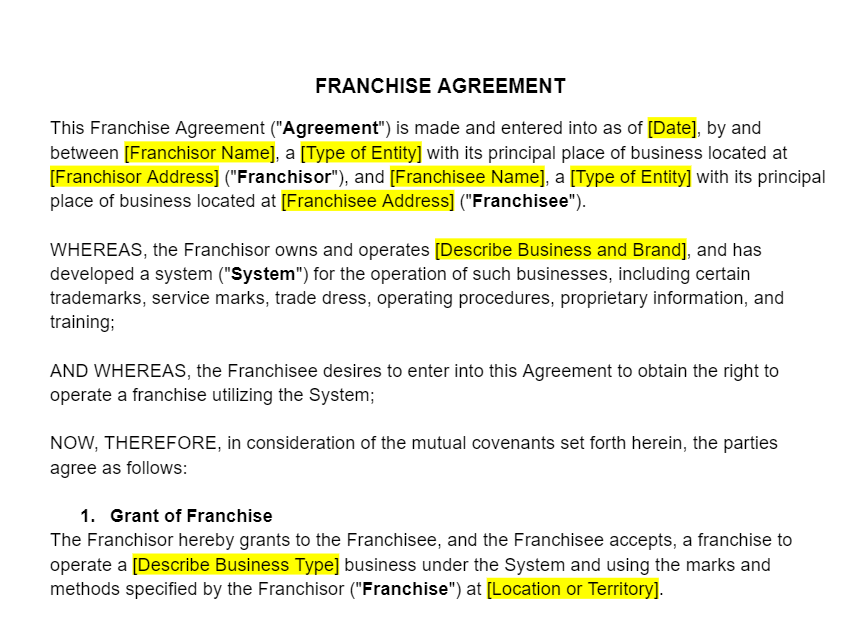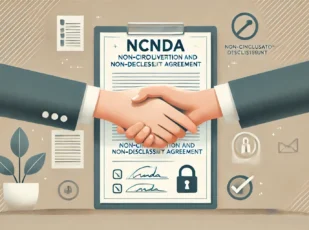
Franchise Agreement Template
12 Downloads
Client, Vendor & Commercial Agreements
January 11, 2025
FreshDox
A franchise agreement is a written document that formalizes the legal relationship between a franchisor and a franchisee, identifying rights, obligations, and various other protections.
This legally binding document shows on what basis the franchised business is going to operate. There is no one-size-fits-all template in franchise agreements considering that they differ according to the industry and business model of the franchisor.
A well-structured franchise agreement can protect the interests of both parties: the franchisor and the franchisee.
Purposes of this agreement: The franchise agreement constitutes the grounds on which to outline the subject matter, the relationship, and the terms of the agreement.
For Franchisors
The franchise agreement protects your brand by:
- Licensing of your marks and other intellectual properties for use.
- Delineation of territorial rights and restrictions for well-defined development zones.
- Defining the royalty structures, fees, and other payment obligations of the franchisee.
- Standard brand compliance needs to be set within the operations manual.
The provisions herein provide a firm basis for maintaining consistency across the franchise network, securing your legal and financial interests.
For Franchisees
The Franchise Agreement protects your investment in the following ways:
- Clearly defines rights and obligations and keeps everything transparent.
- Acts as a forum for providing operational guidance and support from the franchisor.
- Enforcing any promises made during the course of negotiations.
Understanding the franchise agreement is important to the new franchisee in making the right decisions and understanding how their expectations match up with the terms of this agreement.
A well-framed franchise agreement ensures that the franchisor and franchisee stand together for mutual success.
What Franchisors Need to Know about the Franchise Agreement
The Franchise Agreement forms the basis of the legal relationship existing between the franchisor and the franchisee. It is one of the central documents in a franchise system’s operation and organization.
As a franchisor, this is a license to develop the franchised premises for franchisees where they have agreed to operate subject to the same standards of quality as your system and agree to pay recurring fees.
The provisions of this agreement should be prepared and written at the same time as the Franchise Disclosure Document, ensuring that they are clear, understandable, and not in violation of any applicable law.
Development Obligations
The agreement outlines the development obligations of the franchisee, including:
- Establishing franchised locations within a specific time frame.
- Ensuring readiness for daily operations.Addressing real estate requirements for site selection, lease agreements, or ownership.
These obligations ensure the franchisees meet deadlines critical for launching their operations effectively.
Operating Procedures
The franchise agreement requires the franchisee to follow the franchisor’s system and quality control standards strictly. This includes:
- Selling only the products and services approved by the franchisor.
- Complying with operating procedures outlined in the confidential operations manual.
- Ensuring consistency to protect the brand’s reputation and uniformity across all locations.
The franchisee must maintain the proprietary information and follow these procedures to build customer trust. Franchisees are also bound by the laws of the state in which they operate.
Territorial Rights
The agreement defines the territorial rights of the franchisee, which may include:
- Granting an exclusive right within the territory or area of operation.
- Limiting competition by preventing the franchisor from issuing competing franchises in the same area.
Defining the operative boundaries and bases of customers to ensure clarity and fairness.
These terms protect the investments of the franchisee while enabling the franchisor to manage market coverage in a strategic manner.
Room for Negotiation
While franchise agreements have standardized forms for consistency, some items can be negotiated, typically when franchisees negotiate for better terms. These adjustments could be changes to terms, such as location or support but not structural elements like initial franchise fees or royalty rates. Any changes agreed to shall be put into an appropriate written notice or addendum to avoid misunderstandings.
Key Elements of Franchise Agreement
A franchise agreement is a general document setting the basis on which the relationship between the franchisor and the franchisee shall be established. Most agreements have the following major sections:
The Grant of Franchise Rights and Term
This provision discusses the franchisor grants, among them the right to franchisees operating a territory with the use of its marks, proprietary materials, trade dress, and an operations manual. The fees and/or royalties are the responsibility of the Franchisee for such rights.
Typically, the term of the franchise would last from 5 to 10 years. This period of time provides the franchisee with enough time to recover their investment and the franchisor with the benefit of continued growth in the business and brand consistency.
Marks and Brands Handbook
This section describes under what circumstances and how the franchisor’s marks and other intellectual property, including but not limited to confidential information, service marks copyrights, and trade secrets, can be used by the franchisee.
It usually carries restrictions on making use of the marks against the franchisee, inhibiting him/her from incorporating the business name thereof.
The agreement will also cover the brand manual, featuring the specifications of how the consistency in operating the brand is to be maintained. The brand manual is a living document; the franchisor can periodically update it to keep the integrity of the brand.
Initial Training and Ongoing Support
Initial training is usually required, which equips the Franchisee to run a proper business. This section specifies whether the training will be held at their location or your corporate office; how many will attend; and if there are any excess attendance charges.
The franchise agreement will also cover the support the franchisor will provide, besides initial training, to further ensure the success of the franchisee. Support can be in the form of marketing, operational, and business development.
Initial Fees and Ongoing Fees
The franchise agreement will indicate all the various fees payable by the franchisee both at the inception of the business and during the course of his operation. These may include an initial franchise fee payable on the execution of the franchise agreement and any advance inventory or equipment purchases to be made prior to commencement.
It will also include the royalty payment method that could either be a share of the gross sale or a fixed amount payable within a certain periodic cycle, monthly or weekly. The agreement will further state any other recurring fees to be paid for continuous services such as marketing contributions or operation fees.
The entire agreement makes financial obligations transparent so that both parties have clearly defined business relationships. Each of the sections of the agreement is vital in terms of clarity, enforceability, and mutual benefits for the franchisor and the franchisee.
Marketing and Advertising
The advertising section within the franchise agreement defines the responsibilities and obligations concerning the marketing of the franchise. Advertisements are critical in making a brand noticeable, attracting consumers, and maintaining a uniform brand image across various franchisee locations.
This is the section that usually describes the minimum expenditure on adverts, normally calculated as a percentage of revenues or as an absolute value, which the franchisee must contribute on a weekly, monthly, or annual basis.
This section is usually divided into key categories:
Brand Funds: Collected for the overall development and marketing of the franchise system as a whole.
Local Advertising: This is more focused on the promotions for the actual franchise location to a customer base.
Marketing Cooperatives: Enable a number of franchisees in a region to share resources and start large-scale marketing on their own.
Grand Opening: This is the budget to be spent on marketing activities in the case of opening a new franchise in a new territory.
Transfers and Assignment
The transfer and assignment section defines the ways in which the franchise agreement can be transferred to an individual or other entity. These usually require the franchisor’s prior approval of any such transfer, to ensure that the new owner meets the franchisor’s requirements for owning a unit, can maintain brand standards, and can successfully run the franchise operation.
Termination
The section for the termination of this agreement outlines the conditions that may force the franchisee and franchisor to revoke the agreement, including how such cancellation or termination is to be effected. This section falls into two parts:
Termination with No Opportunity for Cure: This applies to events like bankruptcy, insolvency, conviction of a crime, or lapse of operations after a specified time.
Termination with Cure: This type of termination gives the franchisee some time to resolve the violation before the termination becomes absolute.
Insurance and Indemnification
The indemnification section describes the responsibilities of both parties, both the franchisor and the franchisee, in protecting each other from liabilities or losses arising during the franchise relationship. The franchise agreement also calls for the franchisee to obtain insurance policies with minimum coverage amounts, naming the franchisor as an additional insured policyholder.
Non-Competes and Restrictive Covenants
The Franchise Agreement contains covenants during and after the termination of the term, restricting the disclosure of the franchise system and preventing franchisees from operating competing businesses.
In-Term Restrictive Covenants: These prevent the franchisee from competing during the term of the agreement in a similar business.
Post-termination covenants: These prevent the franchisee from opening, operating, or being interested in a competing business for a certain period of time after the expiration or termination of the franchise agreement.
Dispute Resolution
The dispute resolution section sets out the procedure to be followed in case of disagreement or dispute between the franchisor and the franchisee. It generally contains the law governing the agreement and lays down procedures for dispute resolution that may include venue, choice of law, limitations on bringing forward a lawsuit, and potential damage limitations.
Many franchise agreements require the parties to mediate or negotiate as the first step in the dispute resolution process.
Mediation: An impartial third party assists the parties in discussing the issue at hand in the hope of a resolution acceptable to both parties.
Arbitration: The process by which the dispute is forwarded to an arbitrator or a panel of arbitrators, without resorting to formal litigation in court. These provisions provide for an orderly and amicable process of dispute resolution by the inclusion of such provisions in the franchise agreement.
Get a Customizable Franchise Agreement Template with a Free Trial of FreshDox
Customize the conditions of this agreement with a Franchise Agreement Template from FreshDox. Get access to this document and hundreds of customizable templates for business when you sign up for a Basic or Premium account.
Use your 7-day free trial to check out our platform and download any document you want for free! Our professionally designed templates are available in Word and PDF formats and Basic accounts get three free downloads while Premium accounts enjoy unlimited downloads.
Choose your package and start browsing our catalog right now!
Related Templates
Discover more templates that align with your needs and preferences.
Ready to Sign Up?
Start your 7-day free trial and access professionally drafted legal documents built for business use.
- Cancel any time
- 7-day free trial
- From 300+ Customer Reviews












